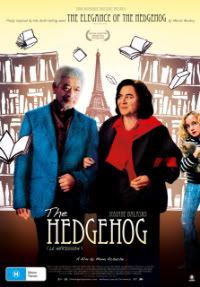 Well, aren’t you a bunch of lucky ducks? Thanks to the generous souls at Madman Entertainment and Readings, I have a double pass to give away to see the new French movie The Hedgehog. It’s an adaptation of the Muriel Barbery novel The Elegance of the Hedgehog, which sold an almost offensive amount of copies thanks to fantastic word of mouth reviews. I haven’t seen it yet, but I’d love to. I’ll mail ’em Australia-wide, if you’re wondering.
Well, aren’t you a bunch of lucky ducks? Thanks to the generous souls at Madman Entertainment and Readings, I have a double pass to give away to see the new French movie The Hedgehog. It’s an adaptation of the Muriel Barbery novel The Elegance of the Hedgehog, which sold an almost offensive amount of copies thanks to fantastic word of mouth reviews. I haven’t seen it yet, but I’d love to. I’ll mail ’em Australia-wide, if you’re wondering.
If you’d like to get your paws on those tickets, all you need to do is comment with a French word that you know. Here, I’ll start: baguette. See? Easy!
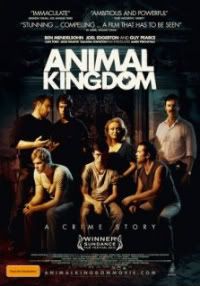 Australia is renowned Australia-wide for being an absolutely fantastic country for churning out movies set in suburbia that are about how awful and mundane life is and how violent it can be to live in even the most innocuous of places. Australian film is made almost entirely of grit; light-hearted movies like Bran Nue Dae are few and far between. As a rule, I stay away from gritty films, because they just don’t float my boat. But Animal Kingdom had received such outstanding reviews from the press and from friends that I decided it was time to launch myself back into the dirty reality of living in Melbourne, where the underbelly of crime is interesting enough that they made a television show about it and then banned it from being shown here. Plus, I do want to support Australian cinema, because one day they’ll make the film adaptation of my Great Australian Novel, right?
Australia is renowned Australia-wide for being an absolutely fantastic country for churning out movies set in suburbia that are about how awful and mundane life is and how violent it can be to live in even the most innocuous of places. Australian film is made almost entirely of grit; light-hearted movies like Bran Nue Dae are few and far between. As a rule, I stay away from gritty films, because they just don’t float my boat. But Animal Kingdom had received such outstanding reviews from the press and from friends that I decided it was time to launch myself back into the dirty reality of living in Melbourne, where the underbelly of crime is interesting enough that they made a television show about it and then banned it from being shown here. Plus, I do want to support Australian cinema, because one day they’ll make the film adaptation of my Great Australian Novel, right?
Animal Kingdom is the tale of a criminal family—a film based loosely on the Walsh Street killings, immortalised in book form by Tom Noble (who cameos in the film as a warden) and translated for the screen by David Michod, who also directed and can barely walk now for all the plaudits loaded upon him. Joshua “J” Cody is a teenager who has just lost his mother, and with no one else to turn to, calls his estranged grandmother for help. Smurf, as she is known, takes him in, and thus he is brought into their criminal lifestyle, where violence and drugs are the norm and armed robbery is how they make their income. The cops are watching their homes and everyone is nervous. Throw in a new young member of the family and, frankly, it can’t go well.
This is a good movie, no doubt. It has an all-star cast, with Jacki Weaver as Smurf, Ben Mendelsohn as J’s uncle Pope, an Edgerton as family pal Baz, Guy Pearce as policeman Leckie, and newcomer James Frecheville as Jay. The plot is real and interesting, the locations excitingly, well, local (note: may apply to myself and my nearby readers only) and the script tight. Despite the subject matter, it is never gory or overtly sexual just for the sake of it. But after hearing the words “amazing” and “incredible” used to describe it, I don’t think it could live up to how fantastic it was going to be in my head.
The problem was investment. Not the financial kind—especially as I had a couple of movie vouchers lying around to get me in—but the character kind. With virtually everyone in the film criminals, including some of the police force, I just didn’t care if everyone died. J’s family were all terrible people who killed and stole and were mean to women. J himself kept a blank face devoid of all charm. To be honest, apart from J’s girlfriend’s gloriously normal family, the only person who wasn’t a giant tool of some kind was Guy Pearce’s Leckie, and he had such a bad moustache that I couldn’t muster up the energy to feel for him either. Which is fine—not everyone needs to be charming to be deserving of life—but it meant that tension was lacking, unlike Harry Brown, where you were desperate for Michael Caine’s Harry and Emily Mortimer’s police officer to survive, and every moment with them in danger was spent on the edge of your seat. It was, however, a brilliant portrait of criminal families, and Jacki Weaver’s Smurf is possibly the most reprehensible of them all: a woman who will not dirty her hands with criminal acts but who shamelessly adores her sons and will do anything in her power to keep them happy, manipulating whoever she can to do so.
There are no down-home comfort moments, no times of levity to understand why the family unit is a bearable one. When I was in high school, I went to a friend’s house once to find an unnerving situation: his mother sitting at the dining room table, chopping the marijuana they grew in their backyard into a little bowl, while her sons let out their anger with violence against the walls or the people around them. It was an awkward, bizarre and faintly dangerous situation to me, and while movies can never compare to reality, I felt little of the same anxiousness watching Animal Kingdom that I did that day.
Animal Kingdom is a worthwhile watch, but I didn’t shake with fear or cry, and I bawl in pretty much anything, including ads for Domestic Blitz or similar help-related television shows when the family looks thrilled about whatever’s happened. It doesn’t take much to set me off into emotional turmoil, and I felt strangely distanced from the whole movie. Still, if you love Underbelly, or hearing someone say the phrase “Bridge Road, Richmond” so you can yell at the screen, “I totally go there for coffee sometimes!” then Animal Kingdom is the film for you.
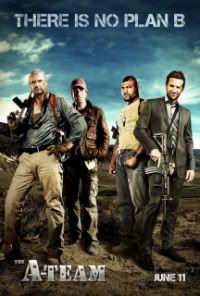 It was my birthday on Sunday. This is relevant to The A-Team for two reasons: one, because part of my list of birthday demands included seeing a movie, and that the movie couldn’t be depressing; and two, because I turned twenty-eight, meaning I was born just about when the television series wrapped up. So we went to see The A-Team wanting nothing but fun, and I wasn’t in the least emotionally invested in the franchise because I never watched the show. This obviously means that I’m here wearing my movie critic hat while not having the full amount of background information. But no movie should be only relevant to those who are going in with all the history behind the subject; it could be better for those people, but it shouldn’t be the whole point. So that is my angle—I am uneducated in the subject of A-Teamerism, and only know Mr T from his cameos in ads for Snickers bars and his sympathetic emotions about people who are not as clever as he.
It was my birthday on Sunday. This is relevant to The A-Team for two reasons: one, because part of my list of birthday demands included seeing a movie, and that the movie couldn’t be depressing; and two, because I turned twenty-eight, meaning I was born just about when the television series wrapped up. So we went to see The A-Team wanting nothing but fun, and I wasn’t in the least emotionally invested in the franchise because I never watched the show. This obviously means that I’m here wearing my movie critic hat while not having the full amount of background information. But no movie should be only relevant to those who are going in with all the history behind the subject; it could be better for those people, but it shouldn’t be the whole point. So that is my angle—I am uneducated in the subject of A-Teamerism, and only know Mr T from his cameos in ads for Snickers bars and his sympathetic emotions about people who are not as clever as he.
Really, you can’t fault The A-Team for its sheer bravado and willingness to be ridiculous. We are introduced to our first member of the Team, Hannibal Smith (Liam Neeson), as he is getting beaten by some ruffians just below the United States border. After his inevitable escape (involving the greatest moment of dealing with frothy Rottweilers this particular animal-sook reviewer has ever seen) he fatefully carjacks one Bosco “B.A.” Baracus (Rampage Jackson) and together they run off to save crafty ladies’ man Face (Bradley Cooper) from getting set on fire by some angry and corrupt policemen. To escape this particularly angry bunch of cops, they enlist the help of batshit pilot Murdock (District 9’s Sharlto Copley and a myriad of accents), currently a psychiatric inmate at a hospital but soon to be piloting our heroes with a hospital helicopter out of international airspace and back home to a big fricking explosion and where the opening credits finally end, stamping out: THE A-TEAM. It’s gloriously stupid and fun, and sets the tone for the whole stupid and fun movie to follow.
After eight years together saving the world, the Team are in Iraq. They are asked by CIA agent Lynch (Patrick Wilson, unrecognisably skinny and blonde and playing the polar opposite to soft touch Nite Owl II from Watchmen) to recover some American banknote plates that are conveniently just around the corner in Baghdad. Their commander pleads with Hannibal not to take the job, but they do. Of course. Because it’s the heroic thing to do, right? So our four boys launch themselves into a complicated mission to recover the plates, which is loud, explody and successful—to a point. Finding themselves framed for the murder of a dear friend, they are stripped of their ranking and shipped into different prisons—because having them altogether would mean they’d bust out in twenty minutes. Instead, and with help, it’s six months.
The subsequent escapes and journey to clear their names are chock full of corn and fun. In prison, B.A. has renounced violence, leaving him unable to kill anyone, even those who killed his friend. He is also scared of flying, and thus continually tricked into getting on planes and helicopters. The rest launch themselves into every situation—including falling out of a plane in a tank with parachutes—with abandon. And I was happy to abandon myself into a world where this was all entirely feasible. I had a blast.
While the surprise enemy is fairly predictable (Chris got it, but I did lead him on with some partially inaccurate speculation of my own) and the message unknown (blow shit up?) the film itself loves to surprise you with wacky plans and is fairly light on seriousness, blood and sex. On the girl front, Captain Charisa Sosa (Jessica Biel, in a surprising love-interest role where she never has to get her kit off or do anything out of character for a member of the United States Army) is Face’s romantic past, and apparently the only one with honourable intentions in wanting to capture them. I was interested to see if the movie would use B.A.’s need for peaceable outcomes as a device to save the day in a convoluted, pain-free way, but an unexpected and depressing Gandhi quote from Hannibal makes him reconsider and created the only aspect of the movie that felt awkward. (Perhaps the message is: Killing is okay if Liam Neeson says so in that lovely voice of his?)
I may have missed some glaring in-jokes, and perhaps they ruined the original A-Team’s carefully constructed vibe. But from an outsider’s perspective, this was a pretty good movie. If you’re desperate for cameos from some of the original cast, you’re going to have to sit through the end credits to get to them. If you’re desperate to see the original B.A., you may as well stay home with the television and wait for the ads. All I know is that if they bother to repeat the tv show now, I will definitely be watching.
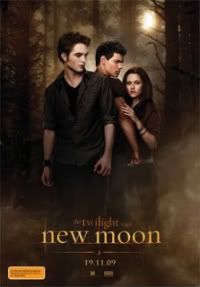 A comedy of epic proportions, this parody of teenage angst is the second movie (in what will probably be a series of four) in the Twilight series, a franchise that uses poorly rendered computer animation, amateur makeup and terrible acting to show how mean, selfish teenagers get the traumatic lives they deserve.
A comedy of epic proportions, this parody of teenage angst is the second movie (in what will probably be a series of four) in the Twilight series, a franchise that uses poorly rendered computer animation, amateur makeup and terrible acting to show how mean, selfish teenagers get the traumatic lives they deserve.
Bella Swan (Kristen Stewart) is an bitter, unsmiling teenager with a stalker boyfriend, Edward Cullen (Robert Pattinson, otherwise known as RPattz ’round the internets), who watches her sleep, tries to control her life, and is, incidentally, a vampire. Her life is pretty cruisy at the start of the movie, as she pals around with her characterless friends, rolls her eyes at her well-meaning and bushily moustached father Charlie, and watches Edward walk around in slow motion looking pale, pouty and syphillic.
Then Edward’s family make the mistake of inviting her over to celebrate her birthday and give her presents, which she never thanks them for and sulks about the whole time. She gets her riotous comeuppance when she cuts her finger opening her present and the vampire family go rabid and all want to eat her. The Cullen family robot, Jasper, flings himself at her—possibly a discourse on how robots will never pass for humans and we’re ridiculous for thinking so?—and Edward has to fight him off while Bella stands around and looks bored. After the stoush is over, Edward admits that he’s a horrible human being who manipulates Bella and that even though he is a creepy stalker, he is going to leave her to try and lead a normal life. So he and his entire family pack up and leave Bella, who, without a man in her life to tell her what to do, does what any normal teenage girl does after a breakup with someone who wears glitter body lotion. She falls out of humanity for three whole months.
When Charlie finally points out that she might be overreacting, and that burning an effigy of Edward and then snorting the ashes would be a much healthier response to the split, she decides haltingly to have another go at interacting with humans. Her laugh-a-minute self-absorption comes to a head when she goes out to see a movie with bubbly Jessica, ignores her completely, then, after taking a small risk and hallucinating that Edward is there warning her, abandons her friend on a dark city street to go and ride motorbikes with the men who were going to rape her in the previous movie, Twilight. It’s a hilarious, exaggerated look at the stupidity of teenagers, and leads to Bella’s new life plan of doing dangerous things so she can hallucinate her boyfriend back into her life. (She really should just get a cardboard cut-out of Edward like every other normal teenage girl.)
The rest of the movie is spent witnessing Bella get up to more and more dangerous hijinks, and spending some chemistry-free time being cranky and demanding around her old friend/pet dog, Jacob (Taylor Lautner), who helps her build a motorbike and also occasionally turns into a blurry and poorly animated werewolf. (The movie’s budget is rumoured to only be $4.20 after the cast was paid.) Will Bella kill herself doing these stupid things? Will she and Edward ever be together again to practise their Olympic-level Synchronised Brooding?
It’s a shamelessly comical film, with droll cliché-mocking moments like Bella descending a staircase in a pretty dress but looking depressed, and the buff Jacob tending to Bella’s extraordinarily minor head wound by taking off his t-shirt and dabbing her head gently with it so he can be shirtless and she can swoon. Making a lead heroine so fantastically unlikeable is no mean feat, but director Chris Weitz has done a great job of it. All the other actors do an equally good job of mocking themselves and the script.
Long drawn-out scene after long drawn-out scene illustrates the tediousness and narcissim inherent of the youth culture it is lampooning. Good for drinking games and laughing until you get a stitch, New Moon is comedy caper like no other. At least until the release of Eclipse next month. Hopefully I’ll have stopped giggling by then.
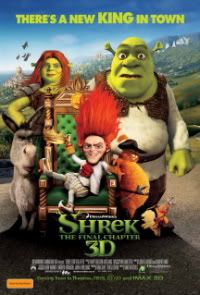 If you’ve got an everyday kind of name, you’ve probably seen a film where the main character has the same name as you. There are probably other movie Fionas out there, but this was the first one I ever saw, and everyone started calling me “Princess Fiona” as soon as the film came out. The Fiona in this film is an ogre. An ogre! I’m not even that green. Since then, my enthusiasm for the Shrek films has waned, as it became an advertising blitzkrieg and spawned three sequels. However, thanks to the lovely people at OPI, who have released a new lacquer range to tie in with Shrek (yes, including two ogre-greens), I scored two free tickets to a preview screening of Shrek Forever After: The Final Chapter in 3D and went along to see it on the weekend.
If you’ve got an everyday kind of name, you’ve probably seen a film where the main character has the same name as you. There are probably other movie Fionas out there, but this was the first one I ever saw, and everyone started calling me “Princess Fiona” as soon as the film came out. The Fiona in this film is an ogre. An ogre! I’m not even that green. Since then, my enthusiasm for the Shrek films has waned, as it became an advertising blitzkrieg and spawned three sequels. However, thanks to the lovely people at OPI, who have released a new lacquer range to tie in with Shrek (yes, including two ogre-greens), I scored two free tickets to a preview screening of Shrek Forever After: The Final Chapter in 3D and went along to see it on the weekend.
Shrek himself shares a fair few things in common with Messrs. Homer Simpson and Peter Griffin. All three are family men, with devoted wives and three children of varying lovability, and each seem to spend all of their screen time doing something unbelievably stupid that destroys their family, and then trying to remedy the situation. In this, Shrek’s fourth existential crisis, he is tiring of the repetition of life; waking up to the noise of his three kids, burping (and farting, this is a kids’ movie after all) and feeding them, doing chores, being part of a tour coach’s route, and his loud, always visiting friends, Donkey (and family) and Puss in Boots. He doesn’t have a job, everyone loves him; it doesn’t really sound that traumatic, does it? Apparently it is. Shrek yearns for his old life back, where everyone was terrified of him instead of wanting to be his friend, and he didn’t have any responsibilities. If only it were possible.
But it’s a movie set in a magical universe, so of course it is! Cue teeny bewigged bad guy Rumpelstiltskin, a man who loves to strike a deal. He’s mad at Shrek, whose timing in regards to saving Fiona cost Rumpel a sweet deal with the King and Queen, who were about to sign a deal with him releasing Fiona in exchange for their kingdom. Now down and out, Rumpel sees Shrek upset at his life, and offers him a deal: one day of freedom from responsibilities, in exchange for one “random” day out of Shrek’s life. Because he is dense and we need the plot to move along, Shrek signs the deal, and bam! He is transported into an alternate universe, where he isn’t a family man, just a free ogre able to terrify at will. Sounds great, and it’s fun for a while but there’s a catch. With the kingdom now signed over to Rumpel, life isn’t all fun and games for the inhabitants, ogres are even more victimised than before, Fiona—tough, powerful and now in charge of the ogres—doesn’t know or love him, and, worse still, Shrek has only a day to find a way out of his contract or lose everything—not just his cherished family, but also his life. Because the day Rumpelstiltskin took was a very, very important one.
I wasn’t expecting much—I’d enjoyed the first movie, but not been enthusiastic about the second two, not purposely watching them but kind of absorbing them by zeitgeist osmosis/Saturday evening channel-flicking. Still, I’ll never pass up a free movie and the opportunity for popcorn, and was utterly pleased to find the whole movie was great fun. The characters were all a blast, from Rumpelstiltskin’s devilish grin and mood-appropriate wiggery (“Get me my angry wig!”) to alternate-universe Puss in Boots (now a tad overfed) and Donkey (much the same, though less annoying than previously). While Rumpel’s cohorts—the Oz-like green witches—are a bit colourless, everyone else is great, the voice actors (from old hats Mike Myers, Cameron Diaz, Antonio Banderas and Eddie Murphy to newish hats Walt Dohrn, Jon Hamm and Jane Lynch) doing a brilliant job at injecting the animations with life. It’s funny and entertaining, and even quite emotional—I got something in my eye at the end but, um, it definitely wasn’t tears; that would make the 3D blurry, after all. Similar to the others, there’s a lot of contemporary music in there, and singing, with bounty hunter Pied Piper laying down some Beastie Boys and so on with his flute and making for some unrestrained dancing.
Once you forgive Shrek for being completely daft, and decide not to think too hard about the time-travel aspects of the plot, Shrek Forever After makes for a pretty agreeable outing. The 3D is good, not always painfully obvious, and not that necessary if you don’t want to fork out the ridiculous excess prices for them and the special glasses (of which we now have six pairs around the house.) Good for kids who want to see mud baths, roaring ogres, and fights on broomsticks; good for parents who would secretly crave any way to get their old lives back (hint: it won’t go well.)
Because I am a martyr to the cause, I stayed until the end of the credits. Now you don’t have to—there’s no final animation. (Also, when it takes three songs to finish the credits, you know they are getting far too long.)
Shrek Forever After is in cinemas on June 17.
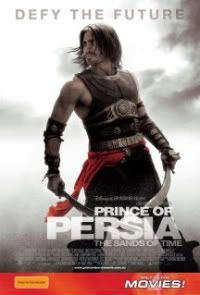 For Christmas the year I turned eight, my whole family pitched in and bought me a Nintendo Entertainment System for my birthday, along with the games Super Mario Brothers and Metroid. That started a long relationship with gaming that I still hold dear today, and I’ve since owned a Playstation, a Nintendo DS and an XBOX360 (and have played games on my PCs), sharing my love of gaming around the hardware makers and thinking I’m cool for twenty years. And in those intervening years, many have tried to turn video games into movies. It seems obvious: take a beloved character, a computer-generated background someone has already worked on and could email to you, nick a storyline that’s already been written (and sometimes quite dramatically and well), throw money at it, and then you have your movie, right? Nope, wrong. Video game adaptations have yet to become enjoyable moviegoing fare, but some mocked the idea that a Disney theme park ride could become a successful movie, and three Pirates of the Caribbeans later, they were wrong. So was there a chance that Prince of Persia could be the one to finally make videogames a legitimate new thing for lazy producers to remake, now that books are being killed by the internets? Well...maybe.
For Christmas the year I turned eight, my whole family pitched in and bought me a Nintendo Entertainment System for my birthday, along with the games Super Mario Brothers and Metroid. That started a long relationship with gaming that I still hold dear today, and I’ve since owned a Playstation, a Nintendo DS and an XBOX360 (and have played games on my PCs), sharing my love of gaming around the hardware makers and thinking I’m cool for twenty years. And in those intervening years, many have tried to turn video games into movies. It seems obvious: take a beloved character, a computer-generated background someone has already worked on and could email to you, nick a storyline that’s already been written (and sometimes quite dramatically and well), throw money at it, and then you have your movie, right? Nope, wrong. Video game adaptations have yet to become enjoyable moviegoing fare, but some mocked the idea that a Disney theme park ride could become a successful movie, and three Pirates of the Caribbeans later, they were wrong. So was there a chance that Prince of Persia could be the one to finally make videogames a legitimate new thing for lazy producers to remake, now that books are being killed by the internets? Well...maybe.
It’s making a killing at the box office and has all the features you could want in a blockbuster. Scoundrel princes and beautiful princesses, open expanses of desert and opulent palaces, parkour-and-stabby-fuelled action plus smooches, a time machine, Jake Gyllenhaal. Eyebrows were raised at casting indie darling Gyllenhaal as the main character in something everyone was already hesitant about, (not least because they cast a blue-eyed actor of Swedish heritage instead of someone, you know, Middle Eastern) but he soon proved to be totally ripped perfectly capable of headlining such a movie. Also launching themselves into this movie with abandon are the unfairly attractive Gemma Arterton, permanently smirking Ben Kingsley, an almost unrecognisable Alfred Molina and various attractive young men who are all brown and glistening from the sun. Not that I noticed.
Gyllenhaal’s Prince Dastan starts off as a young orphaned street boy driven to a courageous act in front of the King of Persia, who adopts him into his family. The movie follows the three princes, as adults, as they are misled into taking over the holy city of Astram. There, celebrating victory, they take from the city the Dagger of Time, not knowing its true power. Astram’s Princess Tasmina does, however, and keeps her eye on Dastan, who has it stuck stylishly into his belt. At the celebratory party, Dastan gives his father a gift, one which has an unexpected outcome when it kills the man who saved him. Accused of the murder, Dastan escapes, with Tasmina leading the way. The rest of the film follows them as Dastan tries to find who killed his beloved father, learns the dagger’s power, tries to outwit Tasmina to keep it, and magic and fear and ridiculousness abounds. As they team up to stop their enemies doing something driven largely by speculation and with a lack of any real clues, will romance flourish? Of course it will. Astonishingly, very little of this involves Tasmina getting stripped of her clothes, and even Dastan keeps his shirt on most of the time, making it vaguely family-friendly as long as you’re okay with an acid-burned body, a throat being cut and an enormous amount of bloodless stabbings.
I can’t lie. It’s a flawed movie. Some characters change from reprehensible to suddenly lovely, and clearly I must have forgotten to pick up my rose-coloured glasses from the front counter because I could not ignore murderers turning sappy for the sake of a cushy ending. It borrows heavily from Pirates of the Caribbean, with Tasmina as spoiled and feisty as Keira Knightley’s Elizabeth, and Dastan as open for wacky escapades as Johnny Depp’s Jack Sparrrow. Time is vague, certain escapes are only partially explained, and why, WHY does everyone speak with a British accent? I don’t mind period-set blockbusters being in English, because I’m sure it saves time and money and subtitles would distract from the fight scenes, but surely adopting the local accent is a better idea than pretending all the Persians were imports from London? It was almost as bad as 300, where the Greeks were apparently Scottish and American and English and Australian. Also, there isn’t nearly enough scaling the sides of buildings and pretending cities are a giant set of monkey bars for my liking, either; I’ve played and observed the second most recent Prince of Persia game and there’s a lot of that, and it’s fun to watch. Worst of all, the males had perfectly flawless eyeliner. There is a chance my anger there is down to jealousy, though.
While it was mildly fun in the big, brash blockbustery sense, it still hasn’t proven to me that video games can be successfully adapted into movies, and I did spend some of the film cringing with my head in my hands over the dialogue or script in general or the editing out of linking scenes—like when Tasmina and Dastan join a cavalcade of dignitaries heading to the King’s funeral, dressing up to hide, but with no real indication of how they managed to stage the disguise or how they ended up back in their old clothes. I’m still holding out for a truly great video game movie. In fact, maybe I’ll write it myself. I think Donkey Kong could be adapted into something Oscar-worthy, don’t you?
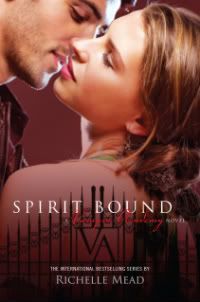 If you haven’t read the first four books in this series, then I must say: Warning, warning! Endless spoilers ahead! This action-packed supernatural series for teens has so much stuff going on that you’ll regret perusing this post ahead if you’ve ever considered reading it.
If you haven’t read the first four books in this series, then I must say: Warning, warning! Endless spoilers ahead! This action-packed supernatural series for teens has so much stuff going on that you’ll regret perusing this post ahead if you’ve ever considered reading it.
I’ve read a few supernatural kids’ books lately, mostly because it’s a large portion of the teen market at the moment. Of course we can blame Stephenie Meyer for this (amongst other things) for showing that writing about vampires as a metaphor for teen sexual angst can make you wealthy at an almost cartoonish level. Many authors have now been able to publish their supernatural books and they are very hit and miss. Of the new deluge of books, I’ve read some terrible ones, and some okay ones. Being that it’s not my favourite genre (though what is may be still up for debate) none of them have really been angels-trumpeting awesome, but as far as pure enjoyment goes, Richelle Mead’s Vampire Academy series is the best I’ve read.
Vampire Academy is the nickname for St Vladmir’s, a school for Moroi (vampires, but good guys) and dhampirs (humans with a Moroi parent, who are on this earth to guard Moroi.) The Moroi get a standard education, while the dhampirs get both a normal education and then guardian training as well, because they will only ever graduate to fight for the Moroi. Who are they guarding against? That would be the Strigoi: vampires who have killed another person, or someone who has been forcibly turned by another Strigoi. Rose, our protagonist, is a sexy ass-kicking dhampir, who is happy being a guardian for her best pal, the Moroi Lissa, but also wants to get out there and beat down some Strigoi. Things become complicated when her trainer, Dimitri, who is so irresistible that even readers want to smooch him, finally caves in to a relationship with Rose, boffs her in a shed, and then is promptly turned Strigoi three pages later. That all took three books to happen, and book four was spent with Rose tracking him down to Siberia, where he kidnapped her and tried to convince her to turn Strigoi so they could go on murderous sexy rampages for eternity. She declined and smacked him down, but had learned that maybe, just maybe, there was a way to turn Strigoi back into who they were.
Spirit Bound finds Rose and Lissa after graduation from St Vlad’s, at the Moroi court, waiting to find what will happen with the next stage of their lives. Now is the time when the guardians are doled out to the Moroi, and while Rose always wanted to be with Lissa, she may not be able due to skipping school to head to Siberia for a few months the year before along with the endless dramas she gets caught up in, and because Lissa is a princess—and the last of her line—they need someone stable to guard her. So now Rose needs to show that she is a good influence, but because she’s the kind of person who will throw herself into ideas with abandon, she takes off, with Lissa and another guardian, to bust someone out of prison who could possibly help Dimitri. And I can’t really say more, because there are so many dramatic twists thrown in I’ll surely ruin something.
Vampire Academy is not a perfect series. It suffers from the overblown chapter endings I hate, where authors seem to feel the only way to get people to continue reading is to end a chapter with someone making a dramatic proclamation that leaves everyone reeling. To Richelle Mead’s credit, she’s not as bad as James Patterson, who does the same thing but has literally more than a hundred chapters per book that all end like that—Mead does rein that in, to about twenty-seven chapters. The writing can be a bit standard and clichéd, and there is a fair amount of brooding about boys. But it is much less painful than Twilight, mostly because Rose is a much better female protagonist, who doesn’t just sit around waiting for boys to be violent towards her and each other (because that’s what they all do, right?) but jumps into the fray, is loyal to her friends, has a finely tuned sense of right and wrong, and makes it her life’s work to fight for what is just. She’s much more realistic, in that she sometimes jumps to conclusions, gets angry or jealous, and gets into petty fights when she’s in a bad mood. She’s sixteen at the start of the books, and teenager or not, that’s how people are. Fallible humans. She’s also up for parties, loves pashing boys, and doesn’t have to worry about the poor helpless mens unable to stop themselves hurting her during sex. She lives in a fantasy world, but the reactions of the people around her make it seem much more grounded in reality than other books. It’s also fun—some of these books are so depressing I can’t figure out the point of trying to save the world when everyone is so annoying—and Rose’s sense of humour sustains her and the reader throughout hard times. And this book, above all others, really slaps her with some hard times.
There are a lot of characters that dash in and out of the books. Some are frontline characters during the first half of the book and then vanish from thought by the end of it. It can be hard to keep up with who’s who, though Richelle Mead will explain who every character is—there’s just a lot of them, and it’s difficult to remember why Rose likes or hates them. (She doesn’t really do neutral.) Despite that, Spirit Bound, and the whole Vampire Academy series, is a rollicking, enjoyable read that covers some familiar ground, makes for some interesting new drama, and is a much better example for the Youth Of Today than Twilight. The final book’s out at the end of the year, and while I’ll pretend to be mature and indifferent, secretly I can’t wait.
 Well, aren’t you a bunch of lucky ducks? Thanks to the generous souls at Madman Entertainment and Readings, I have a double pass to give away to see the new French movie The Hedgehog. It’s an adaptation of the Muriel Barbery novel The Elegance of the Hedgehog, which sold an almost offensive amount of copies thanks to fantastic word of mouth reviews. I haven’t seen it yet, but I’d love to. I’ll mail ’em Australia-wide, if you’re wondering.
Well, aren’t you a bunch of lucky ducks? Thanks to the generous souls at Madman Entertainment and Readings, I have a double pass to give away to see the new French movie The Hedgehog. It’s an adaptation of the Muriel Barbery novel The Elegance of the Hedgehog, which sold an almost offensive amount of copies thanks to fantastic word of mouth reviews. I haven’t seen it yet, but I’d love to. I’ll mail ’em Australia-wide, if you’re wondering. 






